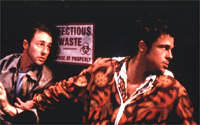|
Fight
Club
(2000)
 A
fabulously berserk runaway train of a movie, David Fincher's Fight
Club is post-
MTV filmmaking at its most assured and courageous. From the
opening process shot — in which the camera travels up
through someone's alimentary canal and out of his mouth, which
has a gun barrel stuck in it — there's very little Fincher
doesn't throw into the first hour of this film. What makes it
all fly beyond just visual bravado is not only the brilliant
gravity of Edward Norton, as an insomniac Dilbert schmuck lost
in a valueless existence, but the rabid satire of novelist
Chuck Palahniuk's tale. The film bristles and rants and throbs
like a shock patient after a smack-
up, but it begins to run right off its tracks somewhere in the
middle. A
fabulously berserk runaway train of a movie, David Fincher's Fight
Club is post-
MTV filmmaking at its most assured and courageous. From the
opening process shot — in which the camera travels up
through someone's alimentary canal and out of his mouth, which
has a gun barrel stuck in it — there's very little Fincher
doesn't throw into the first hour of this film. What makes it
all fly beyond just visual bravado is not only the brilliant
gravity of Edward Norton, as an insomniac Dilbert schmuck lost
in a valueless existence, but the rabid satire of novelist
Chuck Palahniuk's tale. The film bristles and rants and throbs
like a shock patient after a smack-
up, but it begins to run right off its tracks somewhere in the
middle.
Taking the
castrating numbness of modern civilization to task, Fight
Club (the "The" was dropped in Hollywood's
ongoing war against definite articles) roasts the post-
tech world's frustrated masculine aggro on a spit. And for a
while, it seems to be a hilarious, vivid, almost apocalyptic
vision of lost modern men. But then the story does some
twisting in the wind, and Fight Club begins to
deteriorate. The movie's labored, irritating second half tries
its damnedest to dissolve the impact of the first half; and
without a meaningful thrust, Fincher's visual handstands just
come off as pretentious.
Still, after
you see Fight Club, you feel like you've seen something
with horns — the film's tone makes it akin to an American Trainspotting
with digital punctuation and fueled by feelings of
emasculation rather than heroin addiction. Norton's unnamed
protagonist is a white-
collar nobody whose empty life creates both an inability to
sleep and an addiction to catalog consumerism, a dead-
end he solves by attending every terminal-
illness therapy group he can find. Into this void stumbles
Tyler Durden (Brad Pitt), a closet anarchist and lowlife who
lives off the grid in an abandoned house and who splices porn
frames into family films while working as a projectionist. (He
also makes designer soap from human fat stolen from a
liposuction clinic.) After our hero's apartment inexplicably
blows up and he moves in with Tyler, the two men act out their
frustration by simply beating each other to a pulp in a bar
parking lot every Saturday night. Others join in and the
ritual eventually becomes an underground tribal cult, a secret
club in which the joy of hitting and being hit is its own
means and end.
The dark
intimations and subtexts of this wickedly out-
of-
control scenario are potentially huge, and Fight Club
had many places it could go. Unfortunately, it escalates the
fun-
of-
violence dynamic into a silly kind of culty anarchism. Tyler
molds his followers into a skinhead army of bungling social
terrorists whose only purpose is chaos, and the movie grows
unfunny, aimless, and childish. What began as a startlingly
resonant idea becomes tosh. (A fascistic anarchism is kind of
like a round square, isn't it?) On top of that, the movie then
employs the dreaded Trick Ending, and this particular twist
was kind of old when Joseph Conrad first used it. It reduces
the film to a tiresome gimmick — the movie ends up being
about nothing more than its own cleverness. Despite terrific
comic acting (Helena Bonham Carter cooks as the resident
femme) and an atomic first hour, Fight Club makes a few
wrong turns and ends up lost itself. |


 A
fabulously berserk runaway train of a movie, David Fincher's Fight
Club is post-
A
fabulously berserk runaway train of a movie, David Fincher's Fight
Club is post-